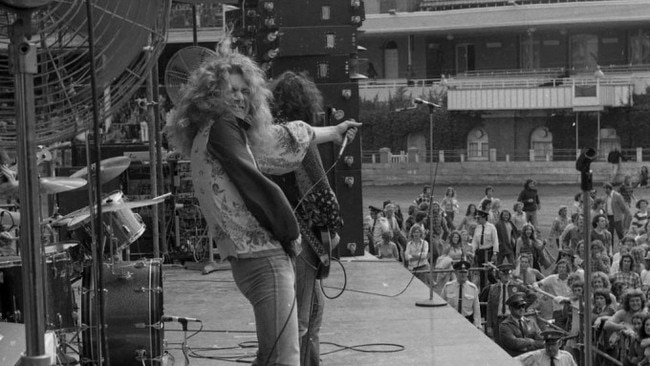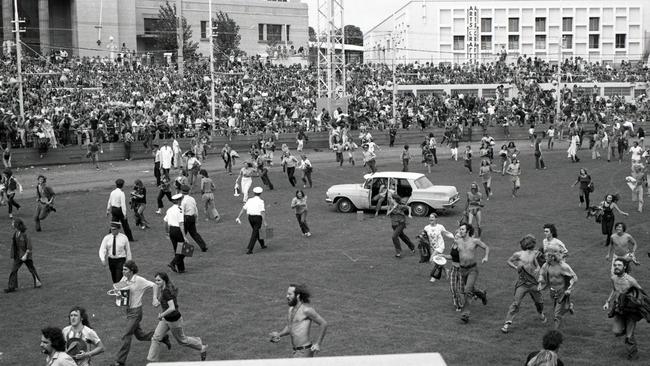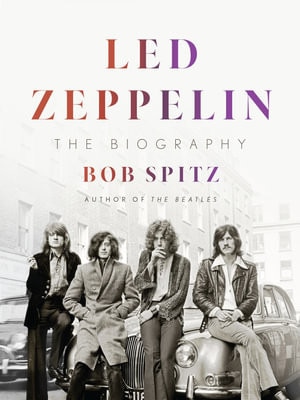Led Zeppelin: the bigger they rock, harder they fall
The Rolling Stones may have taken more drugs, The Who destroyed more hotel rooms, and The Kinks had more fights, but no other band combined it in the same way Led Zeppelin did.

I remember exactly where I was the first time I heard Led Zeppelin. FM radio cranked up, idling away an adolescent summer, my popular music knowledge almost non-existent, the opening notes of Stairway to Heaven transfixed me in a way that no music had done before.
By the time the song ended, I was obsessed. In the mid-’90s era of cassettes and CDs, tracking down their back catalogue was a time-consuming process unfamiliar to today’s youth, with Spotify and iTunes providing instant gratification for musical research. My obsession with Zeppelin extended to books and articles about the band, and from there the introduction to the whole world of 1960s and 1970s popular music.
Having the “right” records gave me an entry to the cool musician crowd at my high school (I was neither cool, nor a musician), establishing friendships – and endless swapping of music trivia – that persist to this day. Listening to Led Zeppelin was the start of my lifelong love of the music and popular culture of this period.
How we read about the bands of this period now, of course, has become a somewhat murkier matter. Bob Spitz is an acclaimed popular music and culture biographer, having penned bestselling works on The Beatles and Elton John. In Led Zeppelin: the Biography, he tackles the one act that was able to match, and in some cases exceed, the commercial successes of its 1960s predecessors. But the darkness of the Zeppelin story, involving under-age groupies, physical violence and assault charges, family tragedies and more, runs alongside their record-shattering albums and concerts. The first major book on the band to be produced in the post-#MeToo era, Spitz is able to convey both the dizzying heights the band reached, as well as some of their more problematic behaviour.

Led Zeppelin were a success from the start. Formed from the ashes of British blues rock group The Yardbirds in 1968, Led Zeppelin were comprised of lead guitarist Jimmy Page, session musician and multi-instrumentalist John Paul Jones, and two wild teenagers from the Black Country: vocalist Robert Plant and drummer John Bonham. The four gelled from their very first session. Managed by the canny and experienced Peter Grant, Zeppelin focused on the US, being rewarded with their very first album reaching the Billboard Top 10. From there, an ever-higher ascent commenced. They were the first band to break The Beatles’ concert attendance record: attracting 56,000 fans in Atlanta in 1973. To date, they have sold more than 300 million records.
Commercial success was only part of the story. While reviled by critics at the time (Rolling Stone infamously refused to put them on the cover, despite their staggering success, until 1975), their blend of blues, rock, folk, and eastern influences set a template for almost every hard rock act that would follow in the 1970s, ’80s, and ’90s.
There’s a reason that Spitz opens this book with an account of the band’s 1969 “Boston Tea Party” set, a concert that went for over four hours, transfixing an audience that included a young Steven Tyler, then in the process of forming Aerosmith. Along with their commercial and musical influences, Zeppelin also set a template of rock star behaviour that eclipsed the previous generation.
The Rolling Stones may have taken more drugs, The Who may have destroyed more hotel rooms, and The Kinks may have had more fights, but no other band combined it in the same way that Zeppelin did. Spitz recounts most of the stories that have appeared in previous Zeppelin books (many unprintable in a family newspaper), but has also tracked down and interviewed a number of the members of the extended Zeppelin entourage. Probably the most significant account comes from Lori Mattix, who at the age of 14 became involved with Jimmy Page. Her retelling of this era of the band, and their problematic relationships with much younger women, is one of the points that separates this book from more celebratory tomes of the past.

The Zeppelin story ended in darkness and tragedy, which Spitz outlines in increasingly chilling detail. The 1977 tour, set to re-establish the band after Robert Plant had been involved in a serious car crash two years previously, was derailed with assault charges being laid against John Bonham, Peter Grant and road manager Richard Cole. Bonham and Page were slipping into serious drug addiction, including heroin.
The tour ended with the tragic death of Plant’s infant son back in England while his father was on the road. The devastated singer was not sure he would ever perform with the band again. Another album in 1979, and a successful concert at the Knebworth Festival, seemed to light the spark once more, only to have it extinguished completely with the death of Bonham after a marathon drinking session in 1980.
Despite enormous pressure (and millions of dollars at stake) to continue, the band called it a day, reuniting only a handful of times since. It is likely that their 2007 reunion, to pay tribute to the life of Atlantic Records founder Ahmet Ertegun, will be their last.
There are still a couple of mysteries around Led Zeppelin that go unanswered in this book. The souring of the relationship with John Paul Jones, who initially was not going to be included in the 1985 Love Aid reunion, and was left out of the Plant/Page “Unledded” tour of 1994 (which prompted his infamous comment at their Rock and Roll Hall of Fame induction, “thank you to my friends for finally remembering my phone number”) is something that remains unsolved. Bob Spitz’s Led Zeppelin: the Biography aspires to be definitive. Although weighing in at nearly 700 pages, Spitz constructs a fast-paced narrative that certainly serves as an important first step for anyone wanting to learn more about this brilliant, turbulent group.
Andrew Broertjes teaches in the School of Humanities at the University of Western Australia, and is currently working on a book about the history of stolen US presidential elections.
Led Zeppelin: The Biography



To join the conversation, please log in. Don't have an account? Register
Join the conversation, you are commenting as Logout